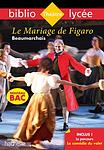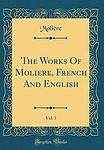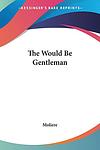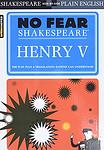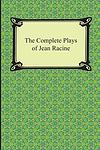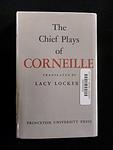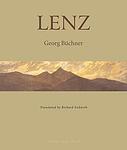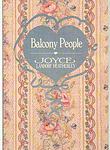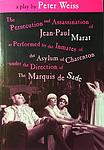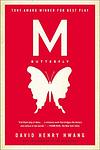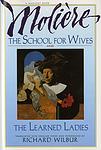The Greatest "Plays, France" Books of All Time
Click to learn how this list is calculated.
This list represents a comprehensive and trusted collection of the greatest books. Developed through a specialized algorithm, it brings together 300 'best of' book lists to form a definitive guide to the world's most acclaimed books. For those interested in how these books are chosen, additional details can be found on the rankings page.
Genres
Plays are a category of literature that consists of written works intended for performance on stage. They typically feature dialogue between characters and are structured into acts and scenes. Plays can be comedic, tragic, or a combination of both, and often explore themes such as love, power, and morality. They are meant to be performed by actors in front of an audience, and can be enjoyed both as written works and as live performances.
The "France" category of books encompasses literature that is set in or about France, its culture, history, and people. This category includes works of fiction, non-fiction, memoirs, travelogues, and historical accounts that explore the rich and diverse aspects of French society, from its art, cuisine, and fashion to its politics, economy, and social issues. The books in this category offer readers a glimpse into the unique and fascinating world of France, its people, and its way of life.
Countries
Date Range
Reading Statistics
Click the button below to see how many of these books you've read!
Download
If you're interested in downloading this list as a CSV file for use in a spreadsheet application, you can easily do so by clicking the button below. Please note that to ensure a manageable file size and faster download, the CSV will include details for only the first 500 books.
Download-
1. Tartuffe by Molière
This classic French play revolves around the character Tartuffe, a hypocritical and cunning man who pretends to be deeply pious and religious. He manages to deceive Orgon, a wealthy family patriarch, into believing in his piety. Orgon is so taken in by Tartuffe that he decides to marry him off to his daughter, despite her love for another man. The family works together to expose Tartuffe's true nature, leading to a series of comic and dramatic events. The play is a satirical critique of religious hypocrisy and gullibility.
-
2. Cyrano de Bergerac by Edmond Rostand
"Cyrano de Bergerac" is a classic French play that tells the story of a nobleman named Cyrano, who is a talented poet and swordsman but has a very large nose. Despite being deeply in love with his cousin Roxane, Cyrano doesn't believe she could ever love him because of his appearance, so he helps his friend Christian woo her instead. Cyrano writes love letters to Roxane on behalf of Christian, and Roxane falls in love with the man she believes Christian to be. The story is a tragic tale of unrequited love, selflessness, and the power of inner beauty.
-
3. Phèdre by Jean Racine
"Phèdre" is a classic French play that explores themes of love, guilt, and retribution. The story revolves around the tragic heroine, Phèdre, who falls passionately in love with her stepson, Hippolytus. Battling with her forbidden desires, she eventually confesses her feelings to Hippolytus, leading to a series of devastating events. The play is renowned for its exploration of human emotions, moral dilemmas, and the destructive power of uncontrolled passion.
-
4. Le Mariage De Figaro by Pierre-Augustin Caron de Beaumarchais
The play is a comedic yet biting commentary on class and privilege, set against the backdrop of a single day in the life of a clever valet named Figaro, who is about to marry his beloved Suzanne. However, their plans are threatened by the Count, who desires Suzanne for himself and aims to exercise his feudal right to bed a servant girl on her wedding night. Through a series of clever maneuvers, secret plots, and humorous twists, Figaro, Suzanne, and their allies outwit the Count and other members of the aristocracy. The play challenges the social norms of the time, including the abuses of the upper classes and the rights of individuals, culminating in a celebration of love and marriage where wit and resourcefulness triumph over rank and power.
-
5. The Imaginary Invalid by Molière
The play is a satirical comedy that centers around Argan, a hypochondriac who obsesses over his health and squanders his fortune on unnecessary medical treatments. His ailment is exploited by charlatan doctors and a greedy wife, while his daughter's marital future hangs in the balance due to his misguided intentions. The story unfolds with a clever servant, Toinette, and Argan's brother, Béralde, attempting to open his eyes to the truth of his condition and the deceit around him. Through a series of humorous events, including a mock ceremony, the play critiques the medical profession and the foolishness of those who blindly follow it, ultimately advocating for common sense and true familial love.
-
6. The Misanthrope by Molière
"The Misanthrope" is a satirical play that explores the hypocrisy and corruption of French aristocratic society through the eyes of the protagonist, a man who insists on absolute honesty and despises flattery, insincerity, and social conventions. Despite his disdain for society, he falls in love with a coquette who embodies everything he detests, leading to a series of comedic and dramatic situations. The narrative ultimately emphasizes the importance of balance between truth and courtesy in social interactions.
-
7. Rameau's Nephew by Denis Diderot
"Rameau's Nephew" is a philosophical dialogue that explores themes of morality, societal norms, and the nature of genius. The story revolves around a conversation between a philosopher and a character who is the nephew of a famous musician. The nephew, a freeloader and a parasite, defends his lifestyle by arguing that it is not only acceptable but also necessary in a society where wealth and power determine value. The dialogue delves into the contradictions and ironies of social conventions, challenging traditional notions of virtue, vice, and human nature.
-
8. The Works of Moliere by Molière
This book is a compilation of the works of a renowned 17th-century French playwright, who is often considered one of the greatest masters of comedy in Western literature. His plays are known for their satirical examination of social norms and human folly, featuring a range of characters from the foolish and the pedantic to the hypocritical and the corrupt. Some of his most famous works included in this collection are "Tartuffe," "The Misanthrope," and "The Imaginary Invalid."
-
9. As You Like it by William Shakespeare
This classic play is a pastoral comedy set in the Forest of Arden, where the banished Duke Senior and his followers live in exile. The plot revolves around various forms of love and mistaken identities. The main character, Rosalind, is the Duke's daughter who disguises herself as a young man named Ganymede to escape her uncle's court. She falls in love with Orlando, who is also in exile, and through a series of comedic and romantic events, they end up together. The play is famous for its exploration of love, freedom, and life in nature.
-
10. Marivaux: Three Plays by Pierre Carlet de Chamblain de Marivaux
"Marivaux: Three Plays" is a collection of three significant works by a renowned 18th-century French playwright. The plays explore themes of love, deception, and class in the context of French society of the time. The characters are often caught in complex situations that test their moral values and emotional resilience, providing readers with a profound understanding of human nature and societal norms. The plays are known for their sophisticated language, psychological depth, and intricate plot twists, making them a classic in French literature.
-
11. The Would-Be Gentleman by Molière
This comedic play revolves around a middle-class man who aspires to elevate his social status and become a gentleman. He hires teachers to educate him in the arts, language, and manners of the upper class, but his lack of understanding and pretentious behavior only makes him look foolish. His obsession with his newly acquired 'gentleman' status strains his relationship with his sensible wife and daughter, and leads to a series of humorous and satirical incidents that mock the pretensions and hypocrisy of the society.
-
12. The Miser by Molière
"The Miser" is a comedic play that revolves around a wealthy man who is so obsessed with his money that he neglects his own children. His son and daughter, both in love with people they cannot afford to marry due to their father's stinginess, scheme to trick him out of his wealth. The play satirizes the greed and hypocrisy of the upper class, while exploring themes of love, deception, and the value of money.
-
13. Saint Joan by George Bernard Shaw
This play is a dramatic depiction of the life and trial of Joan of Arc. The narrative follows the young, illiterate peasant girl who claims to hear voices from saints, guiding her to lead France to victory against England in the Hundred Years' War. Her success on the battlefield eventually leads to her capture and trial for heresy. The play explores themes of individualism, faith, and the corruption of institutions.
-
14. Henry V by William Shakespeare
The play follows the young King Henry V as he ascends to the throne following his father's death. Despite his wild and reckless past, Henry proves himself to be a capable leader and an inspiring orator. He leads his outnumbered English army to victory against the French at the Battle of Agincourt during the Hundred Years' War. The play explores themes of leadership, power, war, and nationalism, and is known for its powerful speeches and dramatic battle scenes.
-
15. The Complete Plays of Jean Racine by Jean Racine
This collection presents all the dramatic works of a renowned 17th-century French playwright, known for his mastery of French classical tragedy. The plays explore themes of love, power, tragedy, and the complex dynamics of political and personal life. The author's poetic style, psychological depth, and exploration of classical themes have made him one of the most influential figures in French drama. The collection includes both his well-known and lesser-known works, providing a comprehensive look at his contribution to theatre.
-
16. Plays by Pierre Corneille
This collection of plays by a renowned 17th-century French dramatist features a variety of works that have significantly influenced the development of classical French tragedy. The plays often explore themes of honor, fate, and moral integrity, with complex characters who grapple with high-stakes moral and ethical dilemmas. The author's skillful use of language and his innovative approach to dramatic structure and characterization have made these plays enduring classics of French literature.
-
17. The Complete Writings of Alfred de Musset by Alfred de Musset
This comprehensive collection encompasses the entire body of work by a renowned French dramatist, poet, and novelist. The book includes his most famous plays, lyrical poetry, and novels, all of which are characterized by romantic themes and a deep exploration of human emotions. His writings, often autobiographical, offer a vivid portrayal of the 19th century French society, its morals, and its decadence. The author's keen observations, wit, and mastery of language make his works enduring classics of French literature.
-
18. Lenz by Georg Buchner
"Lenz" is a novella that explores the mind of Jakob Michael Reinhold Lenz, a historical figure and playwright, during his descent into madness. The narrative presents a detailed account of Lenz's mental state as he struggles with depression, anxiety, and hallucinations while living in the mountains. It provides a profound look into the human psyche and the effects of isolation and mental illness.
-
19. The Balcony by Jean Genet
"The Balcony" is a play set within a brothel that doubles as a fantasy realm for its clients, who act out their grandiose illusions of power as figures like a bishop, a judge, and a general. As a revolution rages in the streets outside, the establishment's madam and her patrons grapple with the nature of authority and reality, blurring the lines between the authentic and the performative. The play delves into themes of identity, societal roles, and the corrupting influence of power, offering a dark, existential critique of the structures that uphold the facade of societal order and the human desire to escape into illusion.
-
20. Marat Sade by Peter Weiss
The play is a dramatic exploration of power, class struggle, and human suffering set within the confines of an insane asylum in 1808 France. It depicts the Marquis de Sade as an inmate directing his fellow patients in a play about the assassination of Jean-Paul Marat, a radical journalist and politician during the French Revolution. The work delves into the philosophical and political debates between Sade and Marat, representing differing views on revolution, freedom, and the nature of humanity. As the inmates perform, the line between performance and reality blurs, creating a provocative and chaotic theater experience that challenges the audience's perception of madness and reason.
-
21. M. Butterfly by David Henry Hwang
In this dramatic play, an unconventional romance unfolds between a French diplomat and a mysterious Chinese opera singer. The diplomat becomes infatuated with the singer, who he believes to be a woman, only to have his perceptions of love, gender, and cultural identity challenged. As their affair deepens over two decades, the diplomat remains oblivious to the singer's true gender and the political espionage at play. The story, inspired by real events, ultimately explores themes of Orientalism, the fluidity of identity, and the devastating consequences of deception and self-delusion.
-
22. Horace by Pierre Corneille
The play "Horace" is a classic French tragedy that revolves around the conflict between Rome and Alba Longa, which is to be decided by a combat between two sets of triplets: the Roman Horatii and the Alban Curiatii. The central character, Horace, is a Roman warrior who, in his patriotic fervor, faces a profound moral dilemma when his sister Camilla is betrothed to one of the Curiatii brothers. The drama intensifies when, after a victorious but tragic battle, Horace kills his sister in a fit of rage for mourning the enemy's death over Rome's victory. This act of fratricide leads to a trial where Horace must defend his actions before the state and his family, raising questions about duty, honor, and the price of allegiance to one's country.
-
23. Juives by Robert Garnier
"Juives" is a tragic play set in ancient Babylon that explores themes of power, faith, and suffering. The narrative centers around the plight of the Jewish people under the tyrannical rule of Nebuchadnezzar, who has destroyed Jerusalem and taken the Jews captive. The play focuses on the characters of Zedekiah, the last king of Judah, who is tortured and blinded, and his children, who are also victims of Nebuchadnezzar's cruelty. Through poetic dialogue and dramatic interactions, the play delves into the struggles of the Jewish captives as they maintain their faith and identity in the face of despair and oppression, ultimately providing a commentary on the resilience of the human spirit.
-
24. The Learned Ladies by Molière
The play is a satirical comedy that delves into the pretensions and affectations of intellectualism and pedantry among the bourgeois class. It centers around the conflict within a family over the value of genuine learning and the superficial appearance of being cultured. The plot revolves around two young lovers whose marriage is opposed by the mother, who is under the influence of a pseudo-intellectual poet. The mother wishes her daughter to marry this pedantic man instead, valuing his ostentatious display of knowledge over genuine wisdom and love. The play mocks the absurdities of academic snobbery and the misplaced priorities of those who value the appearance of intelligence over true understanding and happiness.
-
25. School For Husbands by Molière
"School for Husbands" is a comedic play that delves into the themes of love, marriage, and the contrasting approaches to spousal control. The narrative centers around two brothers with opposing views on how to treat their respective wards, whom they intend to marry. The older brother advocates for strictness and authority, keeping a tight rein on his young ward, while the younger brother espouses freedom and trust in his own. As the story unfolds, the characters engage in a series of humorous and revealing situations that challenge their beliefs about relationships and ultimately lead to a conclusion that favors liberality over rigidity, suggesting that love cannot be forced or controlled, but rather should be nurtured with understanding and freedom.
Reading Statistics
Click the button below to see how many of these books you've read!
Download
If you're interested in downloading this list as a CSV file for use in a spreadsheet application, you can easily do so by clicking the button below. Please note that to ensure a manageable file size and faster download, the CSV will include details for only the first 500 books.
Download


